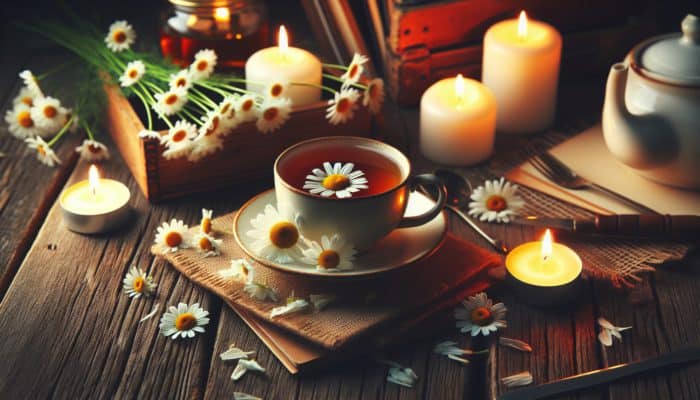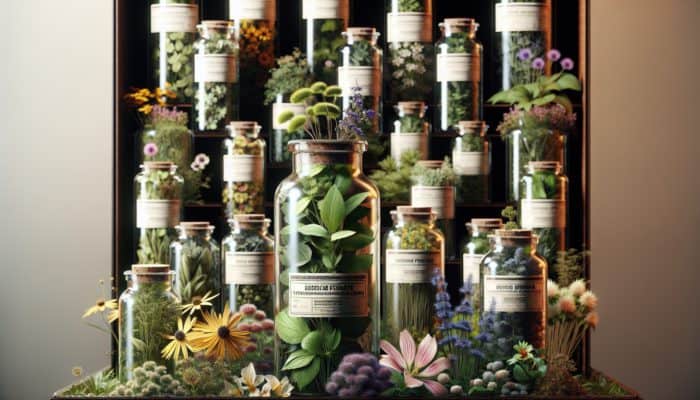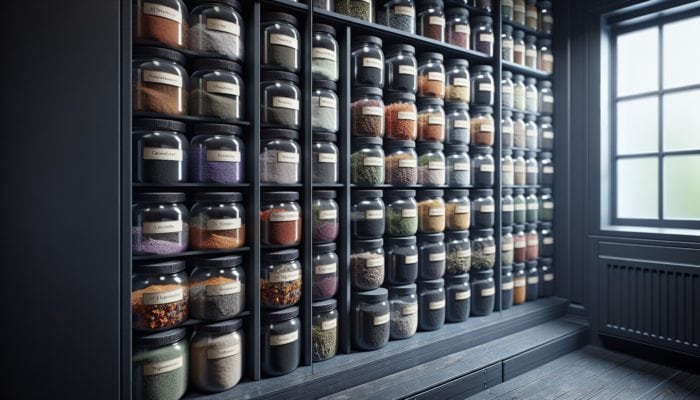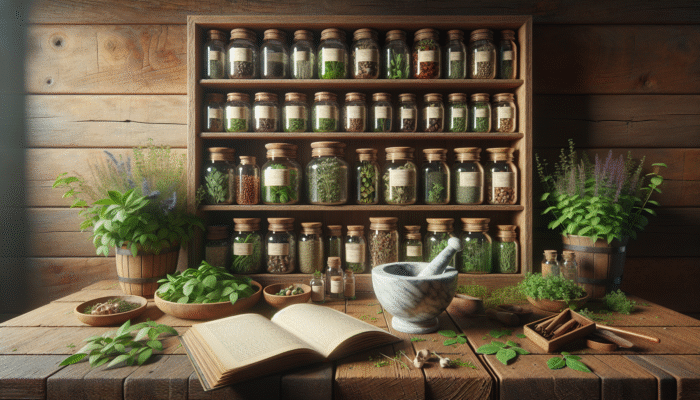Explore the Enduring Heritage of Herbal Blending in the UK for Health Benefits
The practice of herbal blending aimed at specific health benefits carries a rich history in the UK, reflecting centuries of human interaction with nature. This vibrant heritage exemplifies the profound relationship between people and plants, revealing how herbs have been skillfully used to address diverse health needs. Historically, the importance of herbs transcends their culinary applications; they embody the knowledge of ancient healers and are vital to contemporary holistic health practices. The time-honored art of blending herbs for targeted outcomes has resulted in effective remedies for physical ailments, emotional well-being, and spiritual satisfaction, showcasing the multifaceted roles these natural elements play in enriching our lives.
Throughout the ages, herbs have been pivotal to the traditions of British folk medicine, often utilized to remedy common health concerns. Thyme, recognized for its remarkable antiseptic properties, and chamomile, revered for its calming effects on digestion and stress relief, are prime examples. This long-standing bond with nature has sparked a contemporary revival of interest in herbal blends, as modern enthusiasts aim to reinvigorate traditional practices and adapt them to contemporary lifestyles, effectively bridging historical wisdom with current health trends.
In the quintessential British garden, a variety of herbs has assumed a vital role, each with unique attributes and advantages. Herbs like rosemary, mint, and sage thrive in the UK’s temperate climate, offering a wealth of flavors and therapeutic benefits. Rosemary is cherished not just for its aromatic properties but is also esteemed for its potential cognitive-enhancing effects. Similarly, mint is valued for its soothing impact on digestion, making it a crucial element in many herbal blends. Sage, rich in culinary and medicinal history, is acknowledged for its powerful antioxidant properties, further emphasizing the myriad benefits these plants provide.
For those venturing into the world of herbal blends, understanding the regulatory framework that governs their use in the UK is paramount. The rigorous regulations surrounding herbs are established to ensure consumer safety and product effectiveness. The Herbal Medicines Directive outlines essential guidelines for the marketing and distribution of herbal products, necessitating thorough quality assessments. Numerous practitioners and producers pursue certification from reputable organizations, thereby enhancing consumer confidence in their dedication to quality and safety.
Unveiling the Historical Significance of Herbs in British Medicine

Historically, herbs have been essential components of the medical practices throughout the UK. Long before modern medicine’s emergence, communities heavily depended on nature for their healing needs. Ancient texts reveal that herbs were frequently recommended for various ailments, with notable mentions of plants like nettle and willow bark. The herbal knowledge that has been handed down through generations has not only enriched local cultures but also established the foundation for modern herbalism, seamlessly linking ancient wisdom with contemporary practices.
During the medieval period, monasteries emerged as centers of herbal knowledge, where monks diligently cultivated gardens filled with medicinal herbs. This tradition ultimately paved the way for the rise of herbal apothecaries during the Renaissance. Today, the legacy of these historical practices persists, and herbalism is increasingly recognized not merely as an alternative medicine but as a respected discipline that embodies centuries of knowledge.
The culinary application of herbs in British cuisine is also deeply rooted in history. Traditional recipes often incorporated local herbs, amplifying both flavor and health benefits. A quintessential example is the famed English herb blend, ‘Herbes de Provence’, which captures the distinctive flavors of the region. This blend, rich in thyme, sage, and rosemary, not only enriches culinary creations but also imparts the nutritional benefits associated with these herbs.
As interest in holistic health continues to rise, many are revisiting these time-honored remedies by experimenting with blending herbs for specific outcomes that address modern health issues. This resurgence underscores the importance of understanding historical applications, allowing us to reconnect with our roots while innovating to meet contemporary health needs.
Identifying Popular Herbs Grown in UK Gardens
Across the UK, gardens thrive with a diverse range of herbs, each possessing unique qualities that contribute to their popularity. The growing trend of home gardening has led to the rise of herbs such as basil, chives, and coriander, with gardening enthusiasts embracing their versatility. Basil is renowned not only for its aromatic flavor but also for its anti-inflammatory properties, making it an excellent choice for health-conscious blends.
Often overlooked, chives serve as fantastic additions to both culinary and health applications. Rich in vitamins A and C, chives can be combined with other herbs to create vibrant, health-boosting mixtures. Coriander, known for its distinctive flavor, also possesses antibacterial properties, making it invaluable for individuals seeking to enhance their immune system.
The adaptability of these herbs extends to their cultivation methods. Many thrive in pots or compact garden beds, making them accessible for novice gardeners. This ease of growth cultivates a deeper appreciation for herbs, fostering a culture of experimentation with blending herbs for specific outcomes in both health and culinary applications.
The incorporation of herbs into daily life in the UK has also sparked educational initiatives aimed at teaching individuals how to cultivate and utilize these beneficial plants effectively. Community gardens and workshops are becoming increasingly popular, inviting people to immerse themselves in the joys of herb gardening. These initiatives not only promote sustainable practices but also enhance the understanding of the properties and advantages of herbs.
Understanding the Regulatory Environment for Herbal Products
Grasping the regulatory framework surrounding herbal blends in the UK is crucial for anyone intrigued by this field. The regulation of herbal products is primarily governed by the Herbal Medicines Directive, which ensures that these products meet stringent safety and quality standards. This directive mandates comprehensive assessments for herbal remedies, highlighting the need for transparency and consumer protection within the industry.
All herbal products marketed in the UK must either acquire licensing as traditional herbal medicine or be exempt from licensing when used as food supplements. This distinction is pivotal for both producers and consumers, establishing a framework within which herbal products can be marketed safely and effectively.
Furthermore, many herbalists pursue certification from recognized institutions, such as the National Institute of Medical Herbalists. This certification not only reassures consumers about the quality of the products they purchase but also cultivates trust within the herbal community. It signifies adherence to best practices in herbal medicine, including ethical sourcing and sustainable cultivation methods.
As the market for herbal products continues to expand, awareness of these regulatory considerations becomes increasingly significant. Consumers are encouraged to seek certifications and educate themselves about the herbal remedies they choose, empowering them to make informed decisions. This ensures that their exploration of blending herbs for specific outcomes is both safe and beneficial.
Creating Herbal Blends for Enhanced Health and Well-Being

The art of blending herbs for specific outcomes has gained considerable traction in the UK as a holistic approach to health and wellness. This innovative combination of nature’s offerings aims to harness the therapeutic properties of various herbs, creating potent blends tailored to individual health needs and preferences.
The rising popularity of natural remedies and self-care has prompted many to explore the benefits of herbal blends. These blends not only offer a wealth of health benefits but also provide a delightful sensory experience, engaging the senses of taste, smell, and visual aesthetics. As individuals strive to enhance their overall well-being, blending herbs serves as a creative outlet for crafting personalized wellness solutions that align with their unique lifestyles.
Effective Herbs for Boosting Immune Support
Support for the immune system has become a top priority for many individuals aiming to enhance their health, especially during the cold and flu season. Certain UK herbs are celebrated for their immune-boosting properties, making them prime candidates for inclusion in herbal remedies. For instance, elderflower has long been cherished for its ability to alleviate cold symptoms and reduce inflammation, thanks to its rich antioxidant content.
When paired with echinacea, another herb renowned for its immune-enhancing effects, the combination creates a powerful tonic. Echinacea, frequently used during flu season, works synergistically with elderflower to provide comprehensive support. The result is a comforting herbal tea that not only offers soothing warmth but also strengthens the body’s natural defenses.
Another noteworthy option is garlic, well-known for its antimicrobial properties. It can be effectively blended with other herbs, such as thyme and oregano, to create a robust, immune-supportive infusion. This blend not only enhances immunity but also enriches culinary dishes, showcasing the versatility of herbs in both health and flavor.
These blends can be prepared in various forms, including teas, tinctures, or syrups. For those eager to incorporate immune-supporting herbs into their daily routines, a simple infusion of elderflower, echinacea, and garlic can be prepared effortlessly. The process is straightforward: steep the dried herbs in hot water, allowing for effective extraction of flavors and beneficial compounds.
Engaging in the practice of blending herbs for specific outcomes not only provides health benefits but also fosters a sense of empowerment and well-being. As individuals take control of their health journeys, they can explore and experiment with various combinations, discovering what resonates best with their unique needs and preferences.
Formulating Blends for Digestive Health
Recognizing the importance of digestive health is crucial, and many individuals in the UK are actively seeking natural solutions to support their gastrointestinal wellness. Certain herbs have proven particularly effective in promoting digestion, making them excellent choices for crafting specific blends aimed at this goal. Peppermint, for instance, is widely acknowledged for its soothing properties that alleviate bloating and discomfort.
When paired with ginger, known for its anti-nausea effects, this duo creates a potent digestive blend. The warming properties of ginger complement the cooling essence of peppermint, making this combination ideal for those experiencing digestive distress. The resulting herbal tea can be enjoyed after meals, promoting a healthy digestive process and overall comfort.
Another beneficial herb is fennel, often utilized to alleviate gas and cramping. By blending fennel with chamomile, known for its calming effects, a gentle tea can be created that not only soothes the stomach but also encourages relaxation. This blend is particularly advantageous for individuals experiencing digestive discomfort linked to stress, offering a holistic approach to wellness.
Creating these digestive health blends can be as simple as combining equal parts of dried herbs and steeping them in hot water. The key lies in experimenting with ratios until a flavor balance that pleases the palate and supports well-being is achieved.
Incorporating blending herbs for specific outcomes into daily routines not only supports digestive health but also cultivates a deeper connection with the healing properties of nature. Exploring the diverse world of herbs empowers individuals to take charge of their health, enabling personalized wellness interventions that resonate with their specific needs.
Harnessing Herbs for Stress Relief and Relaxation

In today’s fast-paced world, discovering effective methods for stress relief is a priority for many, and herbs can significantly contribute to promoting relaxation and tranquility. Various herbs native to the UK are well-known for their calming effects, making them ideal candidates for creating blends aimed at alleviating stress. Lavender, in particular, is widely recognized for its ability to diminish anxiety and promote restful sleep, proving invaluable amidst the hustle of modern life.
When paired with lemon balm, which is celebrated for its mood-enhancing properties, this combination creates a delightful infusion that calms both the mind and body. The soothing fragrance of lavender harmonizes beautifully with the fresh, citrus notes of lemon balm, resulting in a fragrant tea that can be enjoyed throughout the day. This blend is especially beneficial in the evenings, preparing the body for restful sleep and relaxation.
Another herb worth considering is passionflower, traditionally celebrated for its anxiolytic properties. When combined with chamomile, this duo creates a calming tea that can help alleviate tension and foster tranquility. The floral notes of both herbs meld to create a pleasant and soothing drink, perfect for unwinding after a long day and promoting a sense of calm.
Crafting these stress-relief blends allows individuals to tailor their herbal experiences. A simple recipe could involve equal parts of lavender, lemon balm, and chamomile, steeped in hot water to extract beneficial compounds and create a comforting infusion.
The act of blending herbs for specific outcomes encourages mindfulness, inviting individuals to take a moment for self-care. As one savors the soothing aromas and flavors of these calming blends, it transforms into a ritual that fosters relaxation and peace amidst a hectic lifestyle.
Diving into Culinary Herb Blends for Enhanced Flavor
The culinary landscape of the UK is rich with opportunities to explore the art of blending herbs for specific outcomes. Herb blends not only elevate the flavor profiles of traditional British dishes but also augment their nutritional values, enriching meals with diverse health benefits.
As home cooks and professional chefs strive to innovate, the blending of herbs presents an exciting outlet for flavor experimentation, allowing for personalized culinary experiences that celebrate local produce and the art of cooking.
Transforming Traditional Dishes with Flavorful Herb Blends
Blending herbs in the kitchen enables the creation of unique flavors that enhance traditional British dishes. For instance, the classic combination of parsley, sage, rosemary, and thyme has been used for centuries to season meats, stews, and root vegetables. This blend, often termed the ‘British four’, provides a fragrant and robust base that amplifies the natural flavors of the ingredients, transforming everyday meals into culinary masterpieces.
The key to successful flavor blending lies in understanding each herb‘s unique characteristics. For instance, the strong, pine-like aroma of rosemary complements the earthy notes of sage, while parsley adds a fresh, bright element. This harmonious mix creates a well-rounded seasoning that can elevate even the simplest dishes into gastronomic delights.
Another popular blend is ‘Herbes de Provence’, which combines an assortment of herbs, including thyme, oregano, and marjoram. This mix is ideal for enhancing roasted vegetables and meats, infusing them with delightful Mediterranean flair. The versatility of this blend makes it a staple in many kitchens, offering endless possibilities for meal preparation and flavor exploration.
Experimenting with herb blends is not confined to savory dishes. Sweet dishes can also benefit from intriguing flavor combinations that herbs provide. For example, blending mint with chocolate results in a refreshing dessert that tantalizes the taste buds and delivers a unique culinary experience.
The practice of blending herbs for specific outcomes in culinary applications not only enhances meals but also inspires creativity in the kitchen. As individuals explore different combinations, they uncover new dimensions of flavor that enrich their culinary creations and dining experiences.
Creating Seasonal Herb Blends to Celebrate Nature’s Bounty
Crafting seasonal herb blends is a delightful way to honor the bounty of the UK’s changing landscape. Each season presents a unique array of herbs, allowing for the development of blends that encapsulate the essence of the time of year and the distinct flavors it offers.
In spring, vibrant herbs such as chives, parsley, and dill emerge, making them ideal candidates for a fresh spring herb blend. This mixture can be employed to enhance salads and dressings, introducing a burst of flavor that complements the lighter fare of the season, celebrating the freshness of spring produce.
As summer approaches, basil, mint, and coriander take center stage. A refreshing summer herb blend crafted from these aromatic herbs is perfect for use in salads, salsas, and light pasta dishes. The bright, fragrant flavors of these herbs evoke the essence of summer dining, turning every meal into a celebration of the season’s bounty.
Autumn invites the use of heartier herbs such as thyme, sage, and rosemary, which can be blended to enhance roasted root vegetables and wholesome stews. This comforting blend embodies the warmth of the season, providing a nourishing experience as the weather cools and the craving for hearty meals increases.
During winter, herbs like bay leaf and winter savoury come to prominence, perfect for infusing flavor into slow-cooked dishes and warming soups. By crafting seasonal blends, cooks can capitalize on the herbs that are at their peak while embracing the evolving culinary landscape of the seasons.
Exploring blending herbs for specific outcomes in a seasonal context encourages a deeper connection with nature and the cycles of life. It invites individuals to celebrate the rhythms of the earth while fostering creativity in the kitchen, making culinary experiences more meaningful and enriching.
Pairing Herbs with Local Ingredients for Enhanced Culinary Flavors
Incorporating local produce into herb blends not only celebrates regional flavors but also promotes sustainability and supports local farmers. The UK’s rich agricultural diversity offers ample opportunities for pairing herbs with seasonal ingredients, creating dishes that are both delicious and environmentally friendly.
For example, pairing fresh dill with locally sourced salmon can create a delightful dish that showcases the flavors of both the herb and the fish. Dill, with its anise-like notes, complements the richness of the salmon, achieving a harmonious balance. This combination can be further enhanced by adding lemon juice, brightening the overall flavor profile and adding a zesty twist.
Similarly, pairing rosemary with lamb creates a classic British combination that highlights the distinctive qualities of both ingredients. The robust flavor of rosemary enhances the tender richness of lamb, resulting in a mouthwatering experience deeply rooted in tradition and culinary practice.
When crafting herb blends, it is essential to consider the seasonality of both herbs and local ingredients. By doing so, cooks ensure they are using the freshest produce available, significantly enhancing the overall quality of their dishes. This approach not only results in superior flavor but also fosters a greater appreciation for the local food landscape and the communities that sustain it.
The practice of blending herbs for specific outcomes in conjunction with local ingredients nurtures creativity and innovation in the kitchen. As individuals experiment with various combinations, they discover new ways to celebrate the flavors of their region, creating dishes that reflect their culinary heritage and personal tastes.
Preserving Herb Blends for Year-Round Culinary Enjoyment
Preserving herb blends is an essential skill for anyone wishing to enjoy the flavors of their garden throughout the year. Utilizing methods such as drying and freezing helps maintain the potency and aroma of herbs, ensuring versatility in culinary applications while guaranteeing that these flavors are always at hand.
Drying herbs is a straightforward process that requires minimal effort and can be executed at home. By hanging bundles of herbs in a cool, dark place, they can effectively retain their flavor and aroma. Once dried, herbs can be crumbled and stored in airtight containers, ready for use in cooking or as part of a herbal blend, ensuring their benefits are accessible year-round.
Freezing herbs presents another effective preservation method. By chopping fresh herbs and placing them in ice cube trays with a small amount of oil or water, individuals can create flavor-packed cubes that can be effortlessly added to soups, stews, or sauces. This method preserves the vibrant color and taste of the herbs, ensuring they remain a staple in the kitchen, even during the off-season.
The practice of blending herbs for specific outcomes extends beyond the initial creation of the blend; it encompasses the entire journey, from garden to kitchen. By mastering the art of harvesting and storing herbs, individuals can relish the fruits of their labor throughout the year, promoting a sustainable and fulfilling approach to cooking and wellness.
As individuals embrace the art of preserving herb blends, they cultivate a deeper appreciation for the natural world. This practice encourages mindfulness and sustainability, advocating a lifestyle that values the bounty of the earth and the flavors it provides.
Designing Herb Blends for Special Dietary Needs
The rise of specialized diets has sparked a burgeoning interest in developing herb blends that cater to diverse nutritional requirements. Whether focusing on vegan, gluten-free, or low-sodium options, the versatility of herbs offers a wealth of opportunities for crafting blends that align with specific dietary restrictions and preferences.
For those adhering to a vegan diet, incorporating herbs like nutritional yeast, garlic, and smoked paprika can yield flavorful blends that enhance dishes without utilizing animal products. This combination can be employed to season vegetables, grains, or legumes, providing depth and richness to meals while adhering to vegan principles.
Individuals following a gluten-free diet can also benefit from thoughtful use of herbs in their cooking. By creating herb blends that combine thyme, oregano, and basil, one can elevate the flavors of gluten-free pasta dishes or grain salads, making meals more enjoyable and satisfying without compromising taste.
Low-sodium diets can be effectively supported through the use of herbs that provide natural flavor without the need for added salt. Herbs such as dill, coriander, and parsley can be blended to create seasoning mixes that add zest to dishes, all while promoting heart health and wellness.
The art of blending herbs for specific outcomes within the context of special diets fosters inclusivity in culinary experiences. By exploring various combinations, individuals can create meals that cater to their dietary needs while celebrating the diverse flavors of herbs and the joy of cooking.
As dietary preferences continue to evolve, the practice of blending herbs offers a creative and flexible approach to cooking. It empowers individuals to delve into new flavors and textures while honoring their personal health goals and dietary requirements.
Utilizing Herbs for Beauty and Skincare Purposes
The world of herbs extends far beyond culinary uses, offering a treasure trove of benefits for beauty and skincare. The practice of blending herbs for specific outcomes can lead to the creation of natural skincare products that promote healthy skin, hair, and overall wellness, utilizing nature’s potent properties for cosmetic care.
Many herbs utilized in skincare have long been appreciated for their healing properties, providing individuals with countless opportunities to harness nature’s power in their beauty routines. From soothing skin irritations to nourishing hair, the potential for herbal remedies is virtually limitless, offering a holistic approach to beauty.
Creating Natural Skincare Blends
The shift towards natural skincare is gaining momentum, with many individuals eager to incorporate herbs into their beauty regimens. Herbs such as calendula, lavender, and aloe vera are widely recognized for their skin-soothing properties, making them prime candidates for blending into skincare formulations that promote healthy, radiant skin.
Calendula, celebrated for its anti-inflammatory effects, can be blended with coconut oil to create a nourishing balm for dry or irritated skin. This straightforward formulation can effectively soothe minor cuts, scrapes, and rashes, offering a natural alternative to conventional creams that may contain harsh chemicals.
Lavender, with its calming aroma, is often utilized in skincare for its antiseptic properties. A blend of lavender essential oil mixed with a carrier oil, such as jojoba, can create a soothing facial oil that hydrates and enhances a serene atmosphere during application, further enriching the overall self-care experience.
Aloe vera is another powerhouse herb that can be integrated into various skincare products. Its hydrating and healing properties make it ideal for creating gels or lotions that soothe sunburn or effectively moisturize dry skin, showcasing the versatility of herbs in beauty care.
By experimenting with blending herbs to achieve specific skincare outcomes, individuals can create personalized formulations that cater to their unique skin needs. This process not only fosters creativity but also allows individuals to connect with the healing power of nature, enriching their beauty routines in meaningful ways.
Enhancing Hair Care with Herbal Blends
Herbs also play a pivotal role in hair care, with many offering benefits that promote healthy hair. Common herbs used in hair care include rosemary, nettle, and hibiscus, each contributing unique properties that can enhance hair health and vitality.
Rosemary is famed for its ability to stimulate hair growth and improve scalp health. Blending rosemary essential oil with a carrier oil can create a nourishing hair treatment that promotes circulation and revitalizes hair follicles. This blend can be massaged into the scalp, fostering relaxation while stimulating growth and enhancing overall hair health.
Nettle, often regarded as a weed, is a potent herb for hair care. Rich in vitamins A and C, nettle can be blended into a hair rinse that helps strengthen and nourish strands. A simple nettle infusion can be prepared by steeping dried nettle leaves in hot water, providing a nourishing treatment that can be used after shampooing to enhance hair vitality.
Hibiscus is another fantastic option for hair care, known for its ability to enhance shine and promote moisture retention. A hibiscus hair mask, created by blending dried hibiscus flowers with a carrier like coconut milk, can provide a luxurious treatment that deeply moisturizes the hair, leaving it soft and radiant.
The practice of blending herbs for specific outcomes in hair care empowers individuals to embrace natural solutions for their hair concerns. As they explore different combinations, they discover ways to naturally enhance their hair’s health and appearance, fostering a holistic approach to beauty and self-care.
Creating Anti-Aging Herbal Formulations
The quest for youthful skin has led many individuals to seek natural anti-aging remedies, with herbs offering numerous options. Certain UK herbs are renowned for their anti-aging properties, making them ideal candidates for incorporation into skincare formulations that promote a youthful appearance and vitality.
Rose, for instance, is celebrated for its hydrating and soothing qualities. A blend of rose oil with a carrier oil can create a luxurious facial serum that hydrates and plumps the skin, reducing the appearance of fine lines. This blend nourishes the skin and provides a sensory experience that enhances overall well-being, making it a delightful addition to any skincare routine.
Another herb to consider is gotu kola, known for its ability to stimulate collagen production and improve skin elasticity. By blending gotu kola extract with other hydrating ingredients, one can create a rejuvenating cream that promotes a youthful glow, effectively addressing signs of aging.
Green tea is also acclaimed for its antioxidant properties, making it an excellent addition to anti-aging formulations. A simple blend of green tea infusion with a moisturizer can provide a powerful treatment that protects the skin from environmental stressors while promoting a youthful complexion.
The art of blending herbs for specific outcomes in anti-aging skincare allows individuals to take control of their beauty routines. By exploring these natural options, they can create personalized treatments that promote youthful, radiant skin, enhancing their overall self-care practices.
Utilizing Herbal Remedies for Common Skin Conditions
Numerous herbs have long been recognized for their effectiveness in treating common skin conditions. From acne to eczema, the right blends can offer soothing relief and promote healing for various skin issues.
Tea tree oil, known for its antibacterial properties, can be blended with lavender oil to create a powerful treatment for acne-prone skin. This combination not only helps combat breakouts but also soothes inflammation, making it a valuable addition to any skincare routine aimed at maintaining clear, healthy skin.
Calendula, previously mentioned, can be utilized in blends targeted at eczema and other inflammatory conditions. A calendula-infused oil can be created by steeping dried petals in a carrier oil, producing a soothing remedy that can be applied directly to affected areas to alleviate discomfort and promote healing.
Aloe vera, with its hydrating and cooling properties, is ideal for sunburn relief. Blending fresh aloe vera gel with essential oils such as lavender can provide a refreshing treatment that alleviates discomfort while promoting healing, making it an essential addition to summer skincare routines.
The exploration of blending herbs for specific outcomes in treating skin conditions empowers individuals to connect with nature’s healing power. By utilizing these remedies, they can take charge of their skincare journey while fostering a deeper understanding of herbal medicine and its benefits.
Gardening and Cultivating Your Own Herbs for Health and Flavor
Growing herbs not only provides the joy of fresh flavors but also offers the satisfaction of nurturing plants. The practice of blending herbs for specific outcomes often begins in the garden, where individuals can connect with the natural world while growing their favorite plants and enjoying the rewards of their efforts.
Understanding best practices for cultivating herbs in the UK can significantly enhance the experience, leading to fruitful harvests that can be utilized in both culinary and wellness applications. By embracing these practices, individuals can create a thriving herb garden that enriches their lives.
Key Techniques for Successful Herb Gardening in the UK
Establishing a successful herb garden in the UK requires an understanding of the climate and soil conditions that favor growth. Many herbs thrive in well-drained, fertile soil, making it essential to prepare the ground before planting. Incorporating organic matter, such as compost, can enhance soil quality and promote healthy growth, ensuring that plants receive the nutrients necessary to thrive.
Choosing the right location is also crucial. Most herbs prefer full sun, so selecting a spot that receives at least six hours of sunlight each day is ideal for robust growth. Container gardening is a practical way to grow herbs, offering flexibility in positioning and easier management of soil conditions, making it accessible to all gardeners.
In addition to proper planting techniques, regular watering and maintenance are key to a thriving herb garden. Herbs generally require consistent moisture, particularly during dry periods. Establishing a regular watering schedule can help ensure their health and vitality, promoting lush growth and abundant yields.
The practice of blending herbs for specific outcomes begins with successful cultivation. As individuals nurture their plants, they develop a deeper appreciation for the flavors and properties of the herbs they grow, setting the stage for creative experimentation in the kitchen and wellness applications.
Utilizing Companion Planting Techniques for Thriving Gardens
Companion planting is a gardening technique that involves pairing certain plants to enhance growth and deter pests. Many herbs can serve as excellent companions for other plants, providing benefits that improve overall garden health and productivity.
For instance, planting basil near tomatoes can enhance flavor while repelling pests. The aromatic qualities of basil deter harmful insects, allowing tomatoes to thrive and produce a bountiful harvest. Likewise, mint can be planted alongside cabbage to repel cabbage moths, ensuring a healthier crop and reducing the need for chemical interventions.
In addition to pest control, certain herbs can also improve soil conditions for neighboring plants. For example, planting rosemary with beans can enhance nitrogen levels in the soil, promoting robust growth and benefiting the entire garden ecosystem.
The art of blending herbs for specific outcomes extends to the garden, where companion planting fosters a harmonious and productive environment. By strategically selecting plant pairings, gardeners can create a thriving ecosystem that benefits all its inhabitants, promoting biodiversity and sustainability in their gardening practices.
Harvesting and Storing Your Homegrown Herbs
Properly harvesting and storing herbs is crucial for preserving their potency and flavor. Timing is critical when it comes to harvesting; most herbs should be picked in the morning after the dew has dried but before the sun’s heat sets in. This timing ensures that essential oils are at their peak, enhancing the flavors and benefits of the herbs.
Once harvested, herbs can be stored in various ways to maintain their freshness and potency. For short-term storage, placing cut herbs in a glass of water in the refrigerator can keep them vibrant for several days. For longer-term use, drying herbs is a popular method that retains their flavors and aromas. Hanging bunches of herbs upside down in a cool, dark place allows them to dry naturally, preserving their flavor and fragrance for future culinary applications.
Freezing is another effective method for storing herbs. Chopping fresh herbs and placing them in ice cube trays with olive oil or water creates flavorful cubes that can be easily added to dishes year-round. This method retains the herbs’ vibrancy and ensures that they are always accessible for culinary creations, making it convenient for busy cooks.
The practice of blending herbs for specific outcomes extends beyond the preparation of blends; it encompasses the entire process, from the garden to the kitchen. By mastering the art of harvesting and storing herbs, individuals can enjoy the fruits of their labor year-round, cultivating a sustainable and rewarding approach to cooking and wellness.
Choosing the Right Herbs for Your UK Garden
Selecting the appropriate herbs for UK gardens involves careful consideration of climate, soil conditions, and personal preferences. Many herbs thrive in the temperate climate of the UK, making them suitable for various gardening scenarios while enhancing culinary experiences.
Common herbs such as thyme, sage, and chives are excellent choices for novice gardeners due to their resilience and ease of cultivation. These herbs not only enhance culinary creations but also provide a range of health benefits, making them valuable additions to any garden.
For those looking to expand their herb garden further, considering culinary traditions can inspire the selection of plants. Herbs such as coriander and dill can introduce international flavors to UK gardens, allowing for diverse culinary experiences that celebrate global cuisine.
The practice of blending herbs for specific outcomes begins with thoughtful selection in the garden. By choosing herbs that thrive in their specific conditions, individuals can cultivate a flourishing herb garden that provides a wealth of flavors and benefits, enriching their lives with the essence of nature.
Exploring the World of Herbal Teas and Infusions
The realm of herbal teas and infusions presents a delightful opportunity to explore the benefits of blending herbs for specific outcomes. These beverages not only provide hydration but also harness the therapeutic properties of herbs, making them a popular choice for wellness enthusiasts seeking natural remedies.
Teas can serve as comforting rituals, offering moments of mindfulness and reflection while enjoying the soothing effects of herbal blends. Creating custom tea blends allows individuals to tailor their experiences, enhancing both flavor and health benefits in a way that resonates with their personal preferences.
Popular Herbal Tea Blends in the UK
Herbal tea blends are a cherished tradition in the UK, with many turning to these calming beverages for relaxation and health benefits. Popular blends include chamomile and lavender, known for their calming effects, making them ideal choices for evening consumption. The floral notes of chamomile beautifully complement the soothing aroma of lavender, creating a tranquil experience that fosters restful sleep and relaxation.
Peppermint tea is another favorite, celebrated for its refreshing flavor and digestive benefits. A blend of peppermint with ginger creates a zesty infusion that delights the palate while aiding digestion. This invigorating combination can be enjoyed after meals, providing a soothing conclusion to the dining experience while enhancing digestive comfort.
For those seeking immune support, a blend of elderflower and echinacea makes for a potent tea that can be enjoyed during cold and flu season. This infusion not only provides comfort but also harnesses the beneficial properties of both herbs, supporting overall health and well-being during challenging times.
The practice of blending herbs for specific outcomes in the realm of herbal teas allows individuals to create personalized beverages that cater to their health needs and taste preferences. As they explore different combinations, they can uncover new favorites that resonate with their wellness journeys and enhance their daily rituals.
Crafting Custom Tea Blends for Unique Flavor Experiences
Crafting custom herbal tea blends offers an enjoyable and creative outlet for those interested in the world of herbalism. The key to successful blending lies in understanding the flavor profiles and properties of various herbs, enabling harmonious combinations that deliver both taste and beneficial effects.
When creating custom blends, individuals should consider the intended purpose of the tea. For relaxation, combining calming herbs such as chamomile, lemon balm, and valerian root can provide a soothing experience that promotes tranquility. This blend can be savored in the evenings, offering a moment of respite after a busy day and enhancing overall well-being.
For an invigorating blend, consider pairing energizing herbs such as ginger, ginseng, and yerba mate. This combination provides a natural energy boost, making it an excellent choice for those seeking an alternative to caffeine without the jitters, enhancing focus and vitality throughout the day.
The practice of blending herbs for specific outcomes in tea preparation encourages individuals to experiment and discover combinations that resonate with their tastes and health goals. By exploring various herbs, they can create unique flavor profiles that enhance their tea-drinking experience, making it a delightful journey of discovery.
Mastering Infusion Techniques for Maximum Flavor Extraction
Achieving the best flavor in herbal teas requires a solid understanding of infusion techniques that maximize the benefits of the herbs used. The temperature of the water, steeping time, and quality of the herbs are all critical factors in creating a delightful infusion that captures the essence of each plant.
For delicate herbs such as chamomile or mint, using water just off the boil is ideal. Steeping for 5-7 minutes allows for optimal extraction of flavors and beneficial compounds without becoming overly bitter, ensuring a pleasant drinking experience.
For stronger herbs like rosemary or thyme, longer steeping times are often beneficial. Allowing these herbs to steep for 10-15 minutes can yield a richer infusion that captures the full essence of the plant, offering a robust flavor profile that enhances the overall tea experience.
The practice of blending herbs for specific outcomes in tea preparation extends beyond merely combining herbs. Mastering infusion techniques empowers individuals to create the perfect cup, allowing them to savor the flavors and benefits of their carefully crafted blends, enriching their daily rituals.
Understanding the Role of Herbs in Aromatherapy
The use of herbs in aromatherapy provides a holistic approach to enhancing well-being, with various herbs delivering therapeutic benefits through their essential oils. The practice of blending herbs for specific outcomes in aromatherapy enables individuals to create personalized blends that support emotional and physical health, contributing to a comprehensive wellness routine.
Harnessing the power of aromatherapy invites individuals to explore the sensory experience of essential oils, providing a pathway to relaxation and revitalization through smell and touch, thereby enhancing the therapeutic benefits of herbs.
Essential Oils Derived from UK Herbs
Many herbs native to the UK yield essential oils widely utilized in aromatherapy. For example, lavender is renowned for its calming properties, making it a popular choice for promoting relaxation and reducing anxiety. The soothing scent of lavender oil can be diffused in the home or added to a warm bath for a tranquil experience, providing a sanctuary of peace amid the chaos of daily life.
Rosemary is another herb with notable essential oil benefits. Its invigorating aroma has been shown to enhance mental clarity and improve focus. Blending rosemary essential oil with citrus oils, such as lemon or bergamot, can create a refreshing and uplifting experience, perfect for combating fatigue and promoting alertness.
Peppermint essential oil, with its refreshing and cooling properties, is often used to invigorate the senses and boost alertness. When blended with eucalyptus oil, it creates a powerful respiratory blend that can help clear the airways and support breathing, making it a valuable addition to any aromatherapy practice.
The practice of blending herbs for specific outcomes in aromatherapy allows individuals to explore the vast world of essential oils. By creating their blends, they can tailor their experiences to meet their emotional and physical needs, promoting a sense of well-being and balance.
Crafting Custom Essential Oil Blends for Targeted Purposes
Creating custom blends of essential oils for specific purposes is an exciting aspect of aromatherapy. Whether seeking relaxation, invigoration, or balance, the right combination of oils can yield a powerful therapeutic experience tailored to individual needs.
For relaxation, a blend of lavender, chamomile, and frankincense can be formulated to promote tranquility and peace. This soothing concoction can be diffused in the home or mixed with carrier oils for topical application, creating a calming atmosphere that reduces stress and enhances relaxation.
For energy and focus, consider blending peppermint, rosemary, and lemon essential oils. This invigorating combination can be utilized in a diffuser or as a roll-on for a quick pick-me-up during the day, providing a refreshing boost of energy and clarity when needed most.
The practice of blending herbs for specific outcomes in aromatherapy encourages individuals to engage with their senses and explore personal preferences. As they experiment with different combinations, they can discover scents that resonate with their well-being journey, enriching their experiences and enhancing their overall quality of life.
Frequently Asked Questions About Herbal Blends and Their Uses
What are the advantages of blending herbs?
Blending herbs can enhance flavor, provide various health benefits, and create personalized wellness solutions. It allows for the combination of diverse therapeutic properties, making remedies more effective and tailored to individual needs.
Which herbs are effective for immune support?
Elderflower, echinacea, and garlic are excellent choices for boosting your immune system. These herbs can be blended to create soothing teas or tinctures that support the body’s natural defenses.
How can I grow herbs in my garden?
Choose a sunny location, prepare well-drained soil, and select herbs suited to the UK climate, such as basil, thyme, and chives. Regular watering and maintenance are crucial for a thriving herb garden, ensuring healthy growth and abundant yields.
What are some common culinary herb blends?
Popular UK culinary blends include the ‘British four’ (parsley, sage, rosemary, and thyme) and ‘Herbes de Provence’. These blends enhance flavor in various dishes and have become staples in many kitchens.
How can I preserve dried herbs?
Dried herbs can be stored in airtight containers in a cool, dark place. Alternatively, they can be frozen in ice cube trays to maintain freshness and potency, ensuring their availability for culinary applications throughout the year.
What herbs are beneficial for skincare?
Herbs such as calendula, lavender, and aloe vera are effective for skincare. They can be blended into creams, oils, or balms to provide various skin benefits, enhancing natural beauty and wellness routines.
Can I blend herbs for specific dietary needs?
Absolutely! Herbs can be tailored to suit specific dietary requirements, such as vegan, gluten-free, or low-sodium diets, enhancing dishes while catering to individual preferences and promoting a healthful eating approach.
What is the best way to create herbal tea blends?
Start by selecting herbs that complement each other, considering both flavor and desired benefits. Experiment with proportions and steeping times to achieve the best taste and maximize the therapeutic effects of the herbs used.
What role do herbs play in aromatherapy?
Herbs are used in aromatherapy for their essential oils, which provide therapeutic benefits. Blending different oils can create customized experiences for relaxation, focus, or healing, enhancing emotional and physical well-being.
How can I incorporate herbs into my daily routine?
Incorporate herbs by growing your own, adding them to meals, making herbal teas, or using them in skincare and aromatherapy. This fosters a holistic approach to health and wellness, enriching daily life with the benefits of nature.
Connect with us on Facebook!
The Article: Blending Herbs for Specific Outcomes: A Comprehensive Guide appeared first on https://mcrtherapies.co.uk
The Article Herbs for Specific Outcomes: Your Comprehensive Blending Guide Was Found On https://limitsofstrategy.com


























